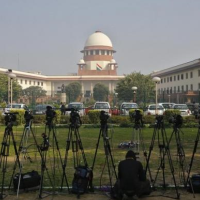Supreme Court Upholds Cyber Freedom in India
 Section 66A was challenged in the Supreme Court in 2012 (file photo: Reuters)
Section 66A was challenged in the Supreme Court in 2012 (file photo: Reuters)
It has been hailed as a verdict that preserves India’s freedom of speech in the internet age. The Supreme Court struck down a controversial law on Tuesday that gave authorities sweeping powers to jail people for offensive online posts.
Section 66A of the Information and Technology (IT) Act had been challenged in the country's top court by law students, bloggers, writers and rights groups, following arrests across the country for statements posted on social media sites.
After a 3-year legal battle, Justices Jasti Chelameshwar and Rohinton F. Nariman ruled the law was unconstitutional. They said in their order that they found "the law hit at the root of liberty and freedom of expression".
"Our Constitution provides for liberty of thought, expression and belief. In a democracy, these values have to be provided within constitutional scheme. The law (Section 66A) is vague in its entirety," the judges noted.
The petitioners argued the "draconian law" introduced in 2008 by the previous UPA administration was misused by politicians to hound critics. Last week, a Class 11 schoolboy was arrested in Uttar Pradesh for writing a critical Facebook post on Samajwadi Party leader and state minister Azam Khan.
"It is a big relief. My daughter was accused of posting offensive remarks and was arrested. I don't think expressing one's views is a crime," said Farooq Dhada.
Shaheen Dhada became a national celebrity after she was arrested in 2012 for questioning in a Facebook post the shutdown of Mumbai after the funeral of Shiv Sena party chief Bal Thackeray. Her friend Renu Srinivasan, who 'liked' her post, was also arrested.
In April 2012, the West Bengal government also arrested a teacher who had emailed to friends a cartoon that was critical of Chief Minister Mamata Banerjee.
After Tuesday's verdict, the NDA government of Prime Minister Narendra Modi said it welcomed the ruling.
"The government absolutely respects the right to freedom of speech and expression on social media and has no intention of curbing it," telecom and IT minister Ravi Shankar Prasad said.
The court, however, upheld the provisions and the guidelines that make social media sites liable for removing objectionable content on being notified by the government.
According to Reuters, both local and foreign internet companies have in the past faced pressure to remove content deemed offensive in India.
The Internet & Mobile Association of India (IAMAI) called the balanced verdict a “momentous victory for the 302 million strong Internet users in India”.
With Google predicting the country would overtake the United States to have the world's largest number of web users by 2018, the Supreme Court’s ruling has ensured that freedom of speech will continue to be the hallmark of this growth.
- Karan Singh
To Learn More:
Supreme Court upholds free speech on internet, scraps 'unconstitutional' Section 66A of IT Act (Hindustan Times)
Supreme Court ditches "Facebook" arrest rules (by Suchitra Mohanty, Reuters)
Section 66A: India court strikes down 'Facebook' arrest law (BBC News)
We respect freedom of speech, don’t support UPA’s stand: Centre on Sec 66A (PTI)
Almost one case every two days: How everybody loves Section 66A in Uttar Pradesh (by Shyamlal Yadav, Indian Express)
The lawyer who took down Section 66A and the girls who inspired her (by Bhadra Sinha, Hindustan Times)
- Top Stories
- Controversies
- Where is the Money Going?
- India and the World
- Appointments and Resignations
- Unusual News
- Latest News
- India College Chain’s Expansion into U.S. Draws Opposition from Massachusetts Officials over Quality of Education
- Milk Shortages in India Tied to Release of New Movies Featuring Nation’s Favorite Stars
- Confusion Swirls around Kashmir Newspaper Ban in Wake of Violent Street Protests
- Polio-Free for 5 Years, India Launches Vaccine Drive after Polio Strain Discovery
- New Aviation Policy Could Increase Service, Lower Ticket Prices






Comments